Whether you’re buying a new grill or replacing the parts on your old one, picking the right grate material is a big choice. Few parts of the grill have a more pronounced effect on the cooking qualities of your barbecue.
When you compare cast iron vs stainless steel grates it’s not just about the cooking performance — the durability, ease of use and maintenance, as well as price are also major factors.
These two materials are both great for making grill grates, but they have some significant differences to consider.
Let’s dig in so you can make the right choice to suit your budget and your cooking preferences.
Basics of Cast Iron vs Stainless Steel Grates
So which is better, cast iron or stainless steel?
Before making a decision, it’s necessary to understand the composition and qualities of both materials. This will ultimately determine how durable they are, how they perform in extremely high heat, and what it takes to maintain them properly.
Here’s a comparison of these two legendary materials.
Cast Iron
Cast iron has been used as a cooking surface for a long time.
Pure iron isn’t the best option to use for cooking because it is soft. Cast iron is an alloy that includes some carbon, making the material harder, stronger, and less likely to be warped by heat.
Cast iron grates are usually heavy and thick. Also, few metals conduct heat as well as it does.
This makes cast iron grates an excellent option for searing and getting nice grill marks.
If weight and care weren’t factors, cast iron would be the perfect cooking material.
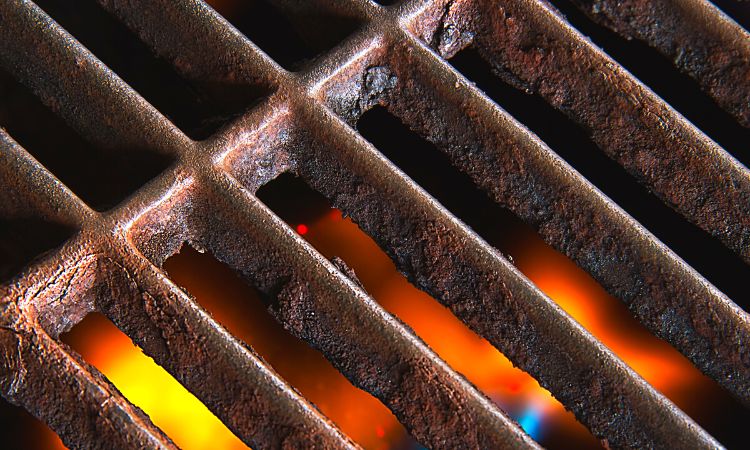
You are probably familiar with cast iron camping skillets. Nothing can put a sear on a steak or provide a more consistent, flavorful cooking experience like a heavy cast iron skillet.
And when properly seasoned, not many modern synthetics can match its non-stick qualities. Lodge Cast Iron is a great resource to learn about this material and how it’s made.
But many people dislike cooking on cast iron because the material rusts easily and is difficult to clean when not seasoned correctly (more about this later).
Cast iron grill grates have all the same benefits and qualities as skillets. You must season them, or food will stick to them and they will rust. And if left out in the elements untreated, they can rust so much that the material starts to fall apart.
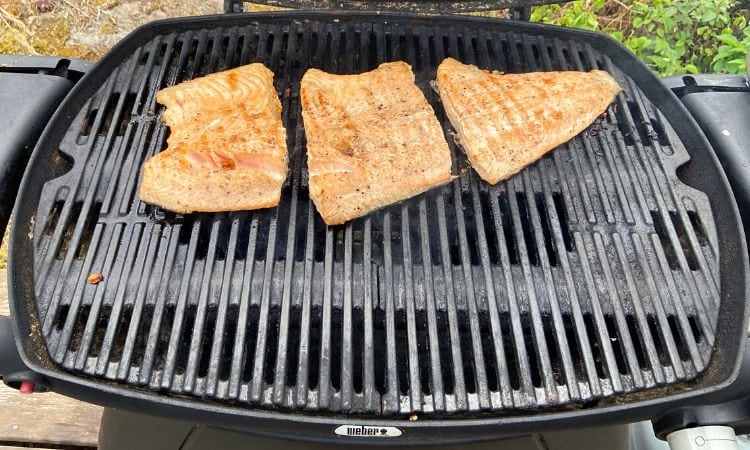
To help them last longer, many grill makers coat cast iron with porcelain enamel. Above is a photo of my Weber Q3200 grill with porcelain-coated cast iron grates. After eight years of use, they are still in great shape!
So long as water and air cannot get to the iron, this will ensure they last a long time. Unfortunately, they are subjected to the same problems if the coating starts to chip.
Pros:
- Great For Searing: Cast iron grates have excellent heat retention and conduction capabilities so you can have nice grill marks and a crispy surface on your foods.
- Durable: If you take good care of your cast iron grate it will last for a long time and the surface will stay smooth.
Cons:
- Rusts Easily: Uncoated cast iron grates rust easily when exposed to the elements. They need regular seasoning and proper storage conditions to keep them from rusting.
- Requires Maintenance: You need to season and clean your cast iron grates carefully after each use.
- Slow Heating: It takes a while to heat up a heavy cast iron grate because it can store plenty of thermal energy.
Stainless Steel
The benefit of stainless steel is that it will not rust. You might occasionally see rust specks on shiny stainless surfaces, but these clean off easily and seldom affect the material.
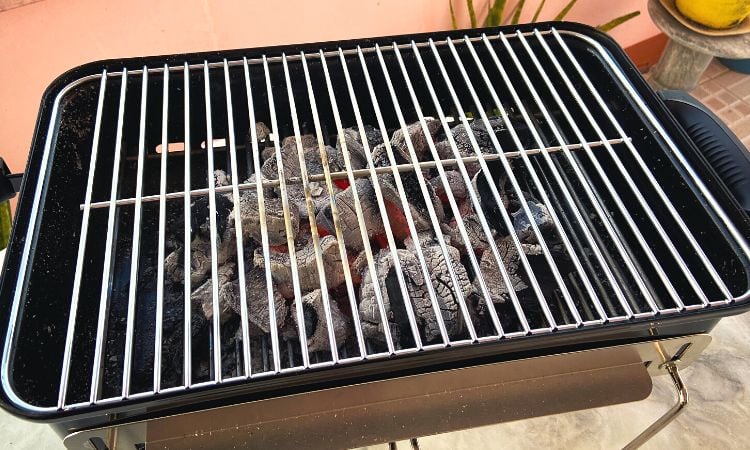
Stainless steel is lighter than cast iron and the grill grates are often thinner.
Skillet makers add copper to the bottom to get it to cook evenly and predictably. This isn’t an option on grill grates, which are simple rods welded together to form a grate.
While stainless grates will not rust, they are lighter and often thinner than cast iron grates. That means they will not distribute the heat very well, making hot spots on your grill more pronounced.
The nicer the grill, the heavier the stainless grill grates will be. Some manufacturers use 10 mm or larger rods to make their grates, and some even use triangular rods to improve sear marks.
For example, Blaze grills have thick grates made with premium quality stainless steel. In the image below you can see the grates of the Blaze Professional LUX grill that are made with 12 mm hexagonal rods.
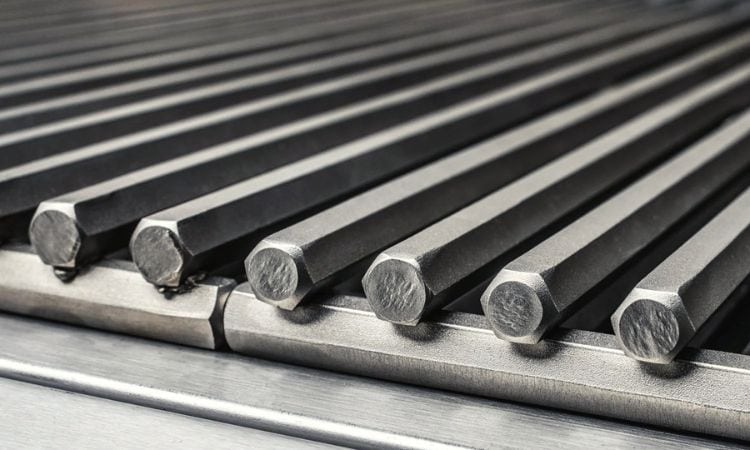
These kinds of grates have enough mass and can retain heat to produce those restaurant-quality sear lines.
Compared to cast iron, thick stainless grates are expensive upgrades but they will last forever if you keep them clean.
But is stainless steel non-stick?
While seasoning cast iron with oil regularly will make it a non-stick surface, stainless will not keep the layer of oil on its surface. It is not porous like cast iron, so the oil is more likely to wipe off.
Instead, you’ll want to oil your food before you put it on the grill — but this is actually a good practice with both types of grates.
Pros:
- Doesn’t Rust: High-quality stainless steel is very resistant to corrosion and can last for a lifetime.
- Heats Up Fast: Does not take very long to heat up, especially if the grates are not exceptionally thick.
- Easy Maintenance: No need for seasoning and easy to keep clean.
Cons:
- Poor Heat Retention: Thin stainless steel grates can’t reserve much heat and will not give you those sear marks. However, extra thick stainless grates will do a great job with searing.
- Might Warp and Become Sticky: Lower quality, thin stainless grates might warp over time and the surface can become rough and sticky. But again, this will not be a problem with thick, high-quality grates.
Which Grates to Choose?
So, which type of grate should you buy?
The truth is, that this is a matter of personal preference and budget. As long as you understand each material’s nuances, they can both provide excellent results.
Depends on What You’re Cooking
The cooking you do is a major factor.
It’s generally accepted that cast iron is superior for producing sear marks. Plus, the even heating you get with cast iron smoothes out grill hot spots and makes cooking more predictable.
However, the extra thick stainless steel grates on premium grills will also do the trick. These types of grills are also designed to provide even heat across the grilling surface.
Budget
Cast iron will provide more bang for your buck if you are on a tight budget. It’s inexpensive, so you can get a grate that will do an amazing job for less money.
Cheap stainless grates tend to be thin and are little more than racks for your food. So if you want a grill with good stainless grates you need to cough up a serious amount of dollars.
Longevity and Care
If there’s one problem with cast iron, it’s that it doesn’t last forever — at least, not when used as a grill grate.
The outdoor life and moisture-trapping environment of your grill are detrimental to cast iron, and it will eventually rust apart. You can reclean, reseason, and keep cooking on them, however.
But since cast iron is inexpensive, the problem is easily remedied by buying new grates every year or two.
If you have bare cast iron grates, make sure that you follow the maintenance instructions in the next chapter of this guide.
On the other hand, stick with stainless if you’re looking for hands-off maintenance and easier cleaning. Stainless grates will last for a lifetime if they are cleaned regularly and cared for.
Cast Iron vs Stainless Steel Grates – Cleaning and Maintenance
Uncoated Cast Iron Grates
The first thing you want to do with your new cast iron grates is to season them. This will prevent foods from sticking and protect the grate from rusting.
Here is how to season cast iron grates:
- Light up your charcoal or gas burner and let the grate heat up properly to around 350 degrees Fahrenheit.
- Use an oil with a high smoke point and brush the grates all over. You can use regular vegetable oil or pork fat, or you can also choose avocado, canola, sunflower, or sesame oil.
- Close your grill lid and let the oil bake on the grates for about 10 minutes. Then apply another coating. You should apply at least three coatings of oil in total.
- After the final coating let the grates bake for another 20 minutes.
Below is a great video that shows you exactly how to do it:
Another important thing is to brush the cast iron grates clean after each cookout.
However, if you got some gunk built up on your grates, you might have to do some deep cleaning. The easiest way to do this is to heat up your grill as hot as you can and close the lid.
After about one hour most of the food residue on the grates has burned off and the rest can be easily brushed off. Now you need to season your grates again, and then they will be as good as new!
Porcelain-Coated Cast Iron Grates
Taking care of porcelain-enameled cast iron grates is very easy. There is no need for seasoning and you can simply brush the grates clean after each cookout.
If you feel like some grime is building up on the grates, just heat up your grill very hot, close the lid, and the grill for about 20 to 30 minutes.
Then turn off the heat and wait for the grates to cool down. You can now remove the grates from the grill and use a scraper and a wire brush to clean the grates thoroughly from all sides.
Stainless Steel Grates
Same as the coated cast iron, cleaning and maintaining your stainless steel grates is effortless. Just brush them clean after you’re done grilling.
If they get filthy over time, use baking soda and vinegar to perform deep cleaning:
How to Prevent Food From Sticking to Your Grill Grates?
Getting your food stuck on the grill grates can be very annoying.
This is not really a problem with sturdy pieces of meat like steaks. But when you’re grilling more delicate items like fish or even ground meat, you really don’t want it to stick to the grates and break apart.
Here are a few tips to prevent sticking:
- Brush some oil on the surface of the food before putting it on the grill.
- Bring the food to room temperature for about one hour before cooking it — cold food sticks more easily.
- If you are not looking to sear your food on high heat, you can place the food on the grill before the grates get too hot. Placing foods on sizzling hot grates gives nice grill marks but also makes it stick more easily.
Final Thoughts on Cast Iron vs Stainless Steel Grates
Which is right for you, stainless or cast iron grill grates?
The best stainless steel grills might be expensive but they are also easier to maintain and can last for a lifetime.
Yet, many professional chefs prefer using cast iron grates. It takes a bit more effort to maintain them, but you’ll be sure to get those nice grill marks.
I have been also very happy with the porcelain-coated cast iron grates on my Weber Q3200 — food doesn’t stick, they are super easy to maintain, and the grates are still in excellent condition after almost a decade of use.
So there is no wrong choice, all three options are great and have their own advantages!
Like many things related to grilling, it’s all about what you want to cook and how you like to use it.
Enjoy Your Barbecue!
-Joonas

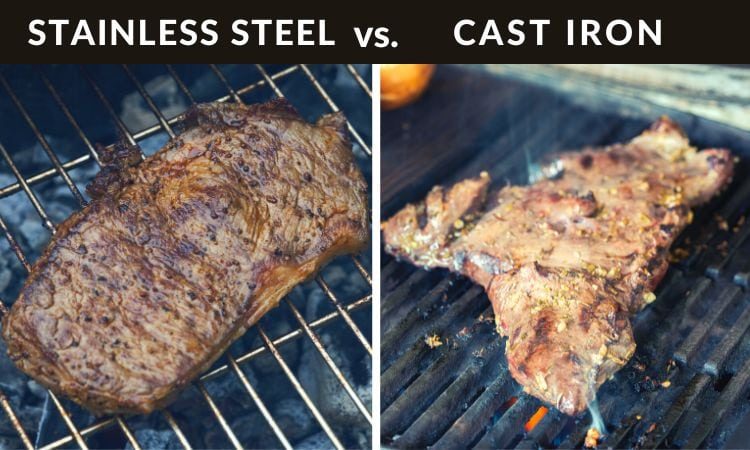



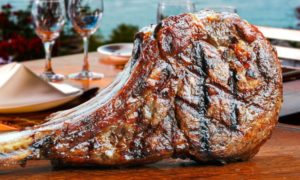

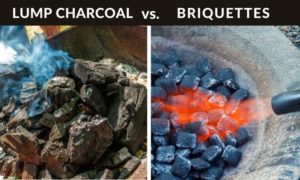

2 thoughts on “Stainless Steel vs Cast Iron Grill Grates – Which is Better?”
HELP : )
Hi guys, I have an old cast iron grate I wanted to use to replace my charcoal grate (the one that you put charcoals on) Will this work for me? Thanks AL
Hi AL,
Yes, you can use that old cast iron grate as long as it fits in the grill.
-Joonas